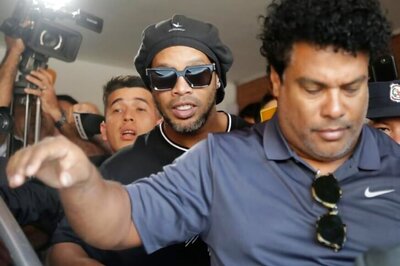
views
Divyangjan, or persons with disabilities (PwDs), are an important social group but they are rarely provided with the right kind of opportunities, skills and platforms to showcase their talent and productive potential. It is unfortunately presumed that PwDs cannot make any meaningful contributions to the growth of our economy, which is nothing but a misnomer. People with disabilities have immense potential to contribute significantly to the economy but they need to be armed with skills best suited for them. It is an irony that PwDs, who account for more than two per cent of our total population, have not been allowed to be a part of mainstream discourse and pursuits aimed at seeking empowerment through inclusion.
Unfortunately, the employability rate among PwDs is very low. It is estimated that only 36 per cent of India’s 26 million PwDs are employed. As per a report of the Union Ministry of Statistics and Programme Implementation on PwDs, nearly 64 per cent of persons with disabilities in India don’t have jobs, and more disabled men than women have jobs. As per an assessment of market intelligence Unearthinsight, only 34 lakh out of almost 3 crore PwDs are employed but 1.3 crore of them are employable. Most of them are employed in organised and unorganised sectors, government entities or are self-employed. It is, therefore, needed to ensure that most PwDs get gainful jobs but how?
In order to ensure that persons with disabilities lead a dignified life independently, they must be provided with a good education so that they have the freedom to choose their career and have equal employment opportunities. There are several examples where Divyang people have achieved impressive feats in many fields on the strength of their indomitable courage, talent and determination. If provided with the right environment, opportunities and skills, they can excel in every field. Education, in particular skill-based education, is the key to the empowerment of every individual, including persons with disabilities.
There is no dearth of jobs for PwDs provided they are equipped with the right kind of soft and hard skills. Some of the most valuable soft job skills for adults with disabilities that employers look for: attention to detail; communication skills; conflict management skills; problem solving skills; teamwork skills; time management skills; and enrichment and life skills. Similarly, some hard job skills for PwDs include accounting, engineering, and technical writing, computer-related jobs, healthcare, career counselor, customer service representative, insurance agent, massage therapist, telemarketer, photographer in wheelchair, desktop publisher, graphic designer, web developer, bank teller, receptionist, financial analyst, landscaper or groundskeeper.
The National Education Policy-2020 also underlines the importance of enabling arrangements in providing equal opportunities for quality education to children with disabilities. The conversion of NCERT text books for Classes I to VI into Indian Sign Language for hearing-impaired children has been done. It is an important initiative to include hearing-impaired students in the mainstream education process. It is heartening indeed to note that the governments are taking several steps for the empowerment of Divyangjan. Inculcating self-confidence among Divyangjan is very important to empower them for which they need to be armed with skills. People with disabilities have talents and abilities just like normal people, and sometimes more than them. Inclusive growth, development of all and confidence of all must encompass in its ambit the aspirations of PwDs.
It is worth noting that the government has enacted the Right to Persons with Disabilities Act, 2016 which came into effect from April 19, 2017. It provides for four per cent reservation in government jobs for persons with disabilities. The Sugamya Bharat Abhiyan (Accessible India Campaign) was launched by the Central government on December 3, 2015 to provide universal accessibility to persons with disabilities so that they can live a meaningful life with dignity. Public buildings, transport systems and information and communication technology have been included under this campaign. Keeping in view the problems related to accessibility faced by the masses, a mobile app has been developed to address the problems of accessibility in a quick and systematic manner.
The government has also set up Indian Sign Language Research and Training Centre (ISLRTC) to promote the empowerment of hearing-impaired persons and to create sign language in the country. The Institute among other functions is continuously preparing sign language dictionaries that have so far included more than 10,000 words. The government is also implementing a Unique Disability Identity Card (UDID) project with the objective of creating a National Database for Persons with Disabilities. So far, over 84 lakh UDID cards have been prepared in 713 districts of all states and UTs.
The Disability Sports Centre is being established at Gwalior and the National Institute of Mental Health Rehabilitation at Sehore, Madhya Pradesh. ‘Divya Kala Shakti’ is organised to showcase the talent and skills of Divyang youngsters and children. However, what is missing is a dedicated programme to equip them with employable or gainful skills. The process of skilling and creating job opportunities for crores of youth through Skill India Mission and Kaushal Rozgar Kendra cannot exclude PwDs. There is a need to work with a specific and targeted approach for them.
We have the Skill Council for Persons with Disability (SCPwD) as a national body to fulfil the mission of mainstreaming PwDs through skill training to enable them to earn a livelihood and lead a life of dignity in the mainstream society and in turn contribute to growing economy of the country. Skill training is also being imparted to them at accredited training centres through trained and certified trainers. Trainers are trained on the NSQC approved job roles aligned for a specific disability. Trainers are also certified on disability orientation and sensitisation.
So far, we have not been inclusive in our approach to skill the people. A few sectors’ artisans received some attention, while many classes of artisans such as carpenters, iron smiths, sculptors, masons and many others that are an integral part of society have been adapting to the changing times to fulfill the needs of the society that were ignored. PwDs were rarely discussed so far as their skilling is concerned. Empowering every section of the society is essential for our country’s development journey. I do totally agree with the argument of Prime Minister Narendra Modi that they should get easy loans, skilling, technical support, digital empowerment, brand promotion, marketing and raw material. Development of traditional artisans and craftsmen while preserving their rich tradition must include PwDs as well.
The writer is a Co-Founder and MD of Orane International, a Training Partner with the National Skill Development Corporation (NSDC), and a Network Member of India International Skill Centres, an initiative of GoI. The views expressed in this article are those of the author and do not represent the stand of this publication.
Read all the Latest Opinions here


















Comments
0 comment